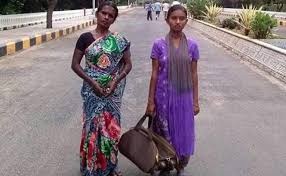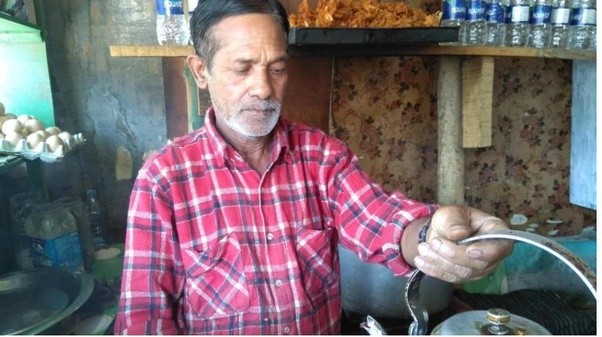STORY 1

Around 6:30 AM on August 8th, 2015, Swati, along with her mother, reached the campus of Anna University in Chennai, India, after traveling overnight for over 350 km by a bus from her village Musiri in the northeastern direction. She had never gone to any major town, let alone Chennai, which is the fourth largest metropolitan area in India.
But now she got there and only a step away from fulfilling her dream of becoming an undergrad student at the university which she rightfully earned through sheer hard work scoring a remarkable1017 out of a maximum score of 1200. And her sickness during the exams didn’t matter.
However, there was a problem. She had come to the wrong university in the wrong place. The invitation letter mentioned ‘Anna Arangam’ meaning ‘Anna Pavilion’ in the regional language Tamil but had inadvertently omitted the address.
Owing to her poor, less-informed background, she assumed it as the more widely known Anna University in Chennai whereas her actual venue was in a different university in a different place called Coimbatore. It would have been half the distance she traveled the previous night had she gone west from her village but it was now over 500 km from Chennai. Her interview was at 8:30 AM.
That was when Swati and her mother were spotted by three morning-walkers from a group called ‘Twalkers’ as they saw them asking around for directions to Anna Arangam. They quickly grasped the situation and instinctively knew that there was only one way left for Swati to make it to the interview.
And they started to act fast. One of them got Swati and her mother some breakfast. Another made an online flight booking to Coimbatore for the next available plane and handed over the tickets. The third person called up the university office in Coimbatore and secured some additional time for her interview.
By 10:05 AM, Swati and her mother were airborne, having never traveled on a plane before. Their plane landed at 11:28 AM. Once they were out of the gate, they got surprised to see someone from the university awaiting them. The registrar of the university received them at the campus and ensured that they had a smooth run.
Swati ended that day with an offer secured in the highly sought after biotechnology major to her sheer delight and profound gratitude. She pledged to herself that she would return to Chennai someday soon when she can afford to repay the kindness of the three angels.
STORY 2.
On May 3rd, 1999, a full-scale war broke out between India and Pakistan in the Kargil district, after the Indian side detected some infiltrations from the Pakistan side along the ‘line of control’, the de facto India-Pakistan border, and retaliated by the Indian side.
Drass is a small, hilly town in the Kargil district at an altitude of over 10,000 feet. It is the second coldest inhabited place in the world after Siberia, with the lowest recorded temperature of -60C.
Owing to its strategic position between Zoji La pass and Kargil, Drass became a target point in the Pakistani war plan. As soon as the war broke out, everyone in and around Drass fled the area to places of safety. But one person stayed back.

Meet Naseem Ahmad, a tea seller, who originally hailed from Dehradun city, which is almost 900 km from Drass. He had ample reasons and many chances to return to Dehradun if he wished, but his heart did not allow him to desert the Indian army engaged in active combat.
He stayed back to serve tea to all the army convoys traversing the area. With no help from anyone as all the other residents were long gone. He did that religiously for almost three months until the war ended on July 26th, 1999, with the Indian side taking full control of the Drass sector. He also prepared food for them using the army rations offered to him by an officer since Drass lost all the trade links with the outside world for the duration of the war.
In the first example, Saravanan, Paramasivam, and Jaisankar, the three Twalkers’ men, didn’t have to bother about a stranger’s plight at all except perhaps giving her the right address. However, they took control of Swati’s destiny with scant regard to their time and money.
This is the first kind of people who hate to be bystanders but act meaningfully when they see others, especially the less-privileged ones, faced with adversity.
In the second example, Naseem, a very ordinary tea seller, who hardly makes his ends meet, performed an extraordinary act of humanity beyond his means and displayed an exemplary sense of duty towards his nation as he deemed fit.
This is the second kind of people who, regardless of their financial and other vulnerabilities, act decisively yet productively for a larger cause when confronted with a calamity. And their deeds, whether small or big, have the power to motivate others to remain positive and focus on the larger task on hand.
These are two cool examples of two kinds of people who should inspire us to build a better tomorrow where caring and sharing becomes a norm rather than an exception.
Photo Credits: India Today
Credit: Sree Rupavatharam

Both the stories are so heart-touching and inspiring…
It definitely has the potential to move the masses to make the world a better place to live in!
Awesome stories ..very inspiring